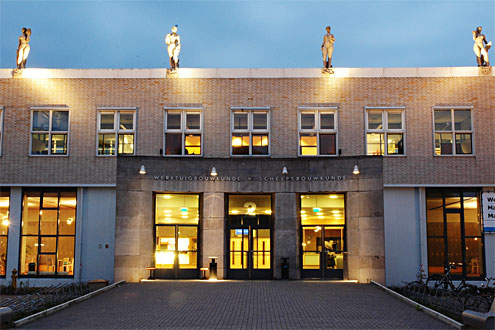About DCSC
Delft Center for Systems and Control (DCSC) coordinates the education and research activities in systems and control at the Delft University of Technology. DCSC has been established in 2003 by merging the systems and control groups of Electrical Engineering (EWI), Mechanical Engineering (ME), and Applied Physics (TNW). DCSC participates in the national research school DISC (Dutch Institute of Systems and Control)
The organizational vision of DCSC is to have a strong integrated community. The department is headed by Prof. Bart De Schutter. The operation is managed by Sandra Prenger. There is a joint secretariat and joint laboratory with a team of technicians.
DCSC has four scientific sections:
Numerics for Control and Identification (N4CI)
Team: Michel Verhaegen, Raf Van de Plas, Carlas Smith, Nitin Myers
The principal foundation of the N4CI team is the analysis of signals in the area of systems and control. Our research covers the whole range from linear to non-linear systems, with spatio-temporally varying dynamical systems being of particular interest. The objective of our research is to extract crucial information from signals in order to understand and diagnose systems, to identify and model their dynamics, and to interact with them in order to reach a specific goal or to improve their performance. A particular focus of our research is on new algorithms that exploit specific features of dynamical systems, often based on physical insight.
Optimization and Learning for Control of Networks (OLCN)
Team: Bart De Schutter, Ton van den Boom, Sergio Grammatico, Matin Jafarian, Azita Dabiri, Meichen Guo
The coming years will see a continuously growing increase of the size, scale, and complexity of computer-controlled and technological systems. Many of the corresponding challenges in the field of hybrid, nonlinear, and large-scale systems and control still have to be solved. It is of utmost importance to design controllers that meet the challenging requirements for these systems in terms of computational efficiency, adaptability, autonomy, efficiency, functionality, reliability, and safety: operation and performance over extended periods of time, even in the presence of uncertainty, noise, disturbances, and model errors must be guaranteed. Finally, the evolutions in the field of mixed-integer optimization, increasing computer power, and increasing and pervasive presence of embedded monitoring, communication, and control units, open new opportunities for analysis and control of hybrid, nonlinear, and large-scale systems.
Data-Driven Control
Team: Jan-Willem van Wingerden, Riccardo Ferrari, Manon Kok, Kim Batselier, Dimitris Boskos, Sebastiaan Mulders,Tom Oomen
Within this group the focus is on the integrated design, analysis and decision making for large-scale (in physical size) multi-disciplinary dynamical systems. We address the fundamental question about what model complexity and actuator/sensor configuration is necessary for all individual system components in order to use these models for reliable and robust model based diagnostics, parameter estimation, monitoring, parametric system optimization and control. Uncertainty quantification and disturbance modelling are essential parts of the integrated design of these multi-disciplinary systems. Therefore, the combination of measurement data with multi-disciplinary system models is essential to enable reliable, robust and efficient decision making.
Networked Cyber-Physical Systems
Team: Tamás Keviczky, Manuel Mazo Jr., Peyman Mohajerin Esfahani, Luca Laurenti, Koty McAllister, Amin Sharifi Kolarijani, Mohammad Khosravi
This is a new team at DCSC, whose research efforts are aimed at improving our understanding and control of cyber-physical systems composed of a large number of interconnected and embedded components. Such networks of systems contain a huge number of sensors and actuators that generate a tremendous amount of data to be processed in real-time in order to increase the autonomy of the participating entities, or accomplish a high level of automation. The scientific challenges currently pursued by the team are of multidisciplinary nature.
